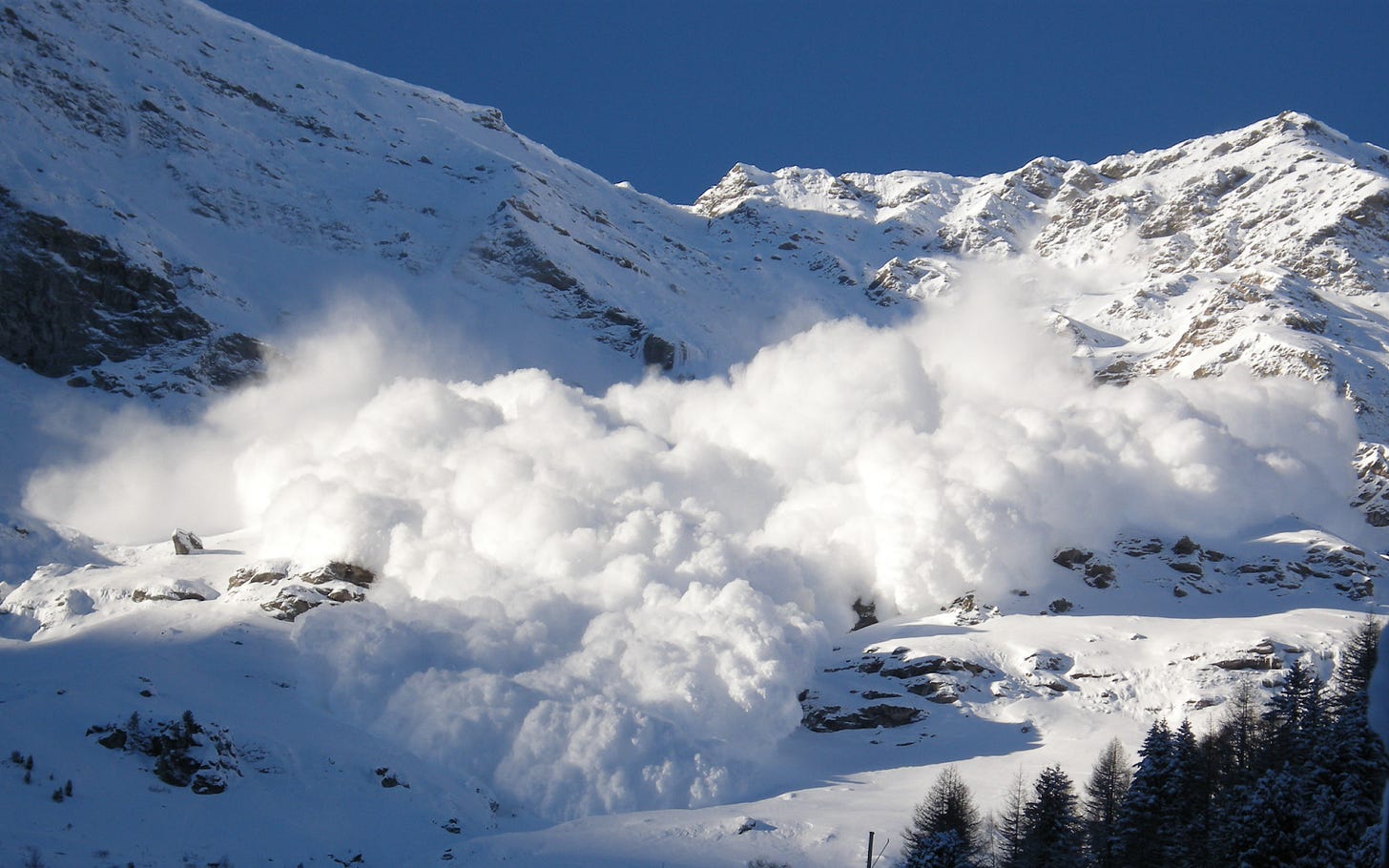Ski resorts often maintain avalanche patrols. Experienced mountaineers trek the high country, especially after snowstorms, to assess the risk of snow slides. At signs of danger, when the top layers of snow appear to be more than the underlying layers can hold to the slope, they deliberately trigger small avalanches, as by the use of explosives. They do this early in the morning before skiers are on the slopes. The idea is that the small avalanches will prevent snow buildup that might result in a much larger and deadly avalanche.
The concept is worth keeping in mind when thinking about another region where avalanches are a threat, namely Wall Street. Just as ski resorts can experience too much of a good thing, namely snow, stock markets can be threatened by runaway periods of buying. Everybody seems to be making lots of money and all appears well, until prices become top-heavy. The slightest thing can trigger a break, and the market collapses in an avalanche that wipes out investors and financial firms.
Can this be prevented? Could somebody trip a small slide to forestall a big one?
The Federal Reserve steps in on occasion, raising interest rates to make stock purchases more expensive for those who buy with borrowed money, and to make bonds more attractive relative to stocks. But higher interest rates hit borrowers of all kinds and tend to depress the economy as a whole.
In fact, the ecosystem of the stock market already contains the equivalent of the avalanche inducers. They're called short sellers, and they make it their business to keep share prices from rising beyond the supporting ability of the underlying assets.
Most investors purchase shares in the present hoping that those shares will be worth more in the future, when the investors will sell and pocket the profit. They bet on rising prices and benefit from them.
Short sellers take the opposite side of the bet. Anticipating a fall in a share’s price, they borrow a share and sell it at today’s price, intending to repay the lender with a share purchased at a future lower price.
This entails a larger risk than that encountered by ordinary investors, whose loss is limited by the amount of their investment. If I buy a share at $50, the most I can lose on that share is $50. But if I sell a borrowed share for $50 and the price rises to $150 before I buy one to repay the lender, I'm out $100. If it rises to $250, I'm out $200. Theoretically there's no limit to what I can lose. A share price can't fall below 0, but there's no upper bound.
Why would I take such a risk? Because I think the conventional wisdom is wrong. The company I'm interested in is overpriced. When people come to their senses, they'll sell. I’ll snap up a cheap share to repay the one I borrowed, and I’ll reap a profit.
In this scenario it will be in my interest to educate the conventional wisdom. In the early 1870s I might have concluded that the building binge in railroads was unsustainable, and have taken a short position in rail stocks. I might then have written magazine articles citing statistics that showed that the rate of rail construction outpaced the growth of the economy. Something had to give. When it did, when rail shares crashed, I cleaned up.
In the 1990s, when Enron was the darling of Wall Street, I did some investigating and discovered shenanigans in the boardroom. I went short on Enron and tipped a reporter at the Wall Street Journal, which printed an exposé. Another win for me.
In the real estate boom of the early 2000s, I noticed something fishy about the repackaging and reselling of mortgages. Typically when debts are bundled, the risk of default goes down. My credit card debt has little connection to your student loan debt. The lack of connection stabilizes the debt package as a whole. But mortgage debt is different. Property prices, especially in speculative periods, tend to go up and down together, being closely tied to interest rates. I guessed the mortgage market was headed for a fall. I went short and made a killing.
Nobody likes me. When they’re suffering, I'm riding high. Many of them blame me for their misfortune, arguing that I'm not just the beneficiary of the condition bringing them pain but the cause of that condition. Some countries make me an outlaw.
This is understandable but foolish.
Far from blaming me, people should be thanking me. As bad as the panic of 1873 was, it would have been worse if delayed until 1875 or 1880. If the Enron cowboys hadn't been roped in when they were, the energy bust might have spread beyond Texas to the rest of the country. If the real estate bubble had continued to grow, the Great Recession might have been the Great Depression 2.0.
I love a good snowfall. But I know that it can pose a danger. So I toss a stick of dynamite here and another there. Small trees get buried, but lives get saved.
Do I get paid for my work? Sure. It's a dangerous job. But somebody's got to do it. You should be glad somebody does.




I have always been a hater of “shorters.” Seemed evil and disingenuous to bet against the market and hope for damage to the system. But your historical analogy has given me a new insight. Not quite sure I’m convinced, but definitely something to ponder. Thank you.